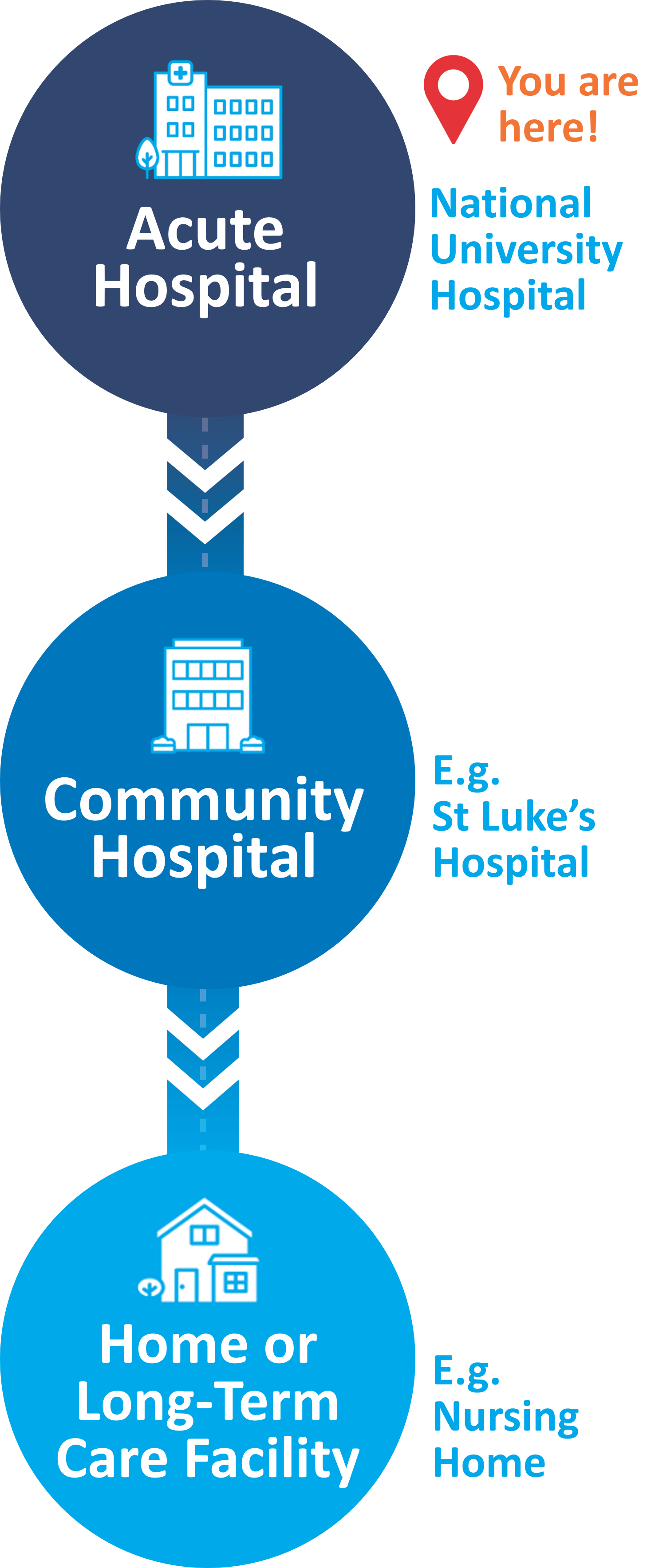Discharge Time & Procedures
2024/06/26

| Acute Hospital (E.g., National University Hospital, NUH) Acute hospitals focus on diagnosis, active treatment, or surgery to stabilise the condition. Treatment at acute hospitals, like NUH, is usually for the short-term and intended for more severe conditions that require acute care facilities.
Community Hospital (E.g., St Luke’s Hospital) Patients who require longer term nursing and rehabilitation care will be referred to sub-acute facilities such as community hospitals for continued care to regain functional abilities before returning to the community.
|
Home or Long-Term Care Facility (E.g., Nursing Home) After completing treatment and rehabilitation, you may return home or be discharged to a long-term residential care facility for extended care. Caregiver(s) may be needed at home depending on your condition. Community support services such as daycare are also widely available. |
You are considered medically ready for discharge from NUH when your condition has been carefully assessed by your doctor to be sufficiently stabilised, such that acute or intensive medical care is no longer necessary.
Exploring Discharge Options
Your care team will explore the following post-discharge care options with you:
- Your own home
- Community Hospital*
- Long-term Care Facility, e.g. Nursing Home*
*Amount of subsidies each patient is eligible for is determined by household means-testing.
Making Your Decision
You and your family will be given time to make a decision. If the decision is for you to receive longer term nursing and rehabilitation care at the community hospital or long-term care facility, your care team will collect your information to help you apply for placement in these facilities.
Processing Your Application to Community Hospital or Long-term Care Facility
The care team will keep you updated on the estimated waiting time for your placement.
Your doctor will advise when you can be discharged. To ensure your well-being, we recommend that a family member or a caregiver be with you on the day of your discharge.
Please ensure that no personal belongings are left behind, and return all hospital properties such as gowns, pajamas, blankets and baby vests before leaving the hospital.
Discharges take place between 10am and 11.30am.
Do check with the ward nurse for your estimated discharge time. An additional day’s rate may be applicable if you extend your stay after 12pm.
If your caregiver is unable to fetch you during the discharge time,
- our discharge lounge is available for your use - for free - to rest while you wait to be fetched
(*discharge lounge closes at 6pm) - an ambulance can transport you to your preferred destination at a cost
Our staff will assist you with the following discharge procedures:
- Follow-up appointment:
Arrange your follow-up appointment(s) at the Specialist Outpatient Clinic, if necessary. You may view, make, change or cancel your appointment here - Self-care procedures:
Teach you basic self-care procedures and provide you with health education so that you can care for yourself at home. - Discharge medication:
In certain circumstances, give you the medication your doctor has prescribed and advise you on the medicine usage. - Hospital discharge summary/medical certificate:
Give you a hospital discharge summary and/or medical certificate. Please request for the medical certificate from your doctor or nurse in advance.
In the event of an emergency after your discharge, please proceed to the nearest polyclinic, General Practitioner (GP) or Emergency Department to seek medical treatment.
- Please check the balance medication you have at home and inform your doctor two days before discharge. This allows the doctor to prescribe the correct amount of medications for you.
- Request for additional over-the-counter (OTC) medications and retail items will not be included unless the doctor assesses that you need them.
- Discharge medication should be collected at the Pharmacy. Our pharmacists will counsel you or your caregiver on the proper use of medication.
Please refer to the bill payment options
here
How does the social overstayer policy work?
Notification of Social Overstayer Policy
- Patient is certified medically ready for discharge but declines discharge options offered by the care tea
Implementation of Social Overstayer Policy
- Seven days later, the social overstayer policy kicks in and all applicable government subsidies, Integrated Shield Plans (IPs) and civil service benefits will cease.
- Patients may be charged the full unsubsidised rates for the period of their overstay, which may be up to $695 per additional day spent in NUH.


















